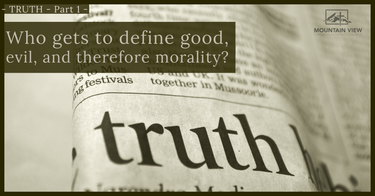 Last time we looked at truth, and how the Bible reveals it as the beginning, middle, and end of a matter. Today we want to ask, “Where can we find this truth?”. And I think this is a pertinent question today, because we’re seeing two sets of facts for everything, and legislation is passed on the concept of an alternate reality. How, then, shall we go forward? Upon what do we place our trust? The Bible tells us in Isaiah 65:16 that the answer is the God of the Scriptures. Why? – Twice there He is called the “God of truth”, and the book of James tells us, “Every good gift and every perfect gift is from above, coming down from the Father of lights, with whom there is no variation or shadow due to change”. Romans 1:25 even draws a distinction between sinful man and perfect God when it says, “they exchanged the truth about God for a lie”. It’s because of this that John Calvin wrote, “Nothing is deemed more precious by God than truth”. Indeed, remember that word “emet”, which means “truth”? – It is also translated as “faithfulness”, meaning when you read of the steadfast love of the Lord or the faithfulness of the Lord – as frequently found in the Psalms – it’s saying that truth is at the core of who God is. But where can we find the revelation of this truth? – In the self-disclosure of God’s Word, both written and living. We’re told in Psalm 12:6, “The words of the Lord are pure words”, and 2 Timothy 3 and Hebrews 4 state that the Bible is useful for growing, teaching, rebuking and changing – not just our behaviors, but our very motives and thoughts, because the Lord is actively speaking to us as we engage with it. 2 Timothy 3:15 even calls the Bible “the Word of truth”, and Jesus says, “[God’s] word is truth” (John 17:17). It may not – as I brought up last time – prove that vanilla is the best flavor of ice cream, but it will define and shape our worldview and our being around what is objectively true. But notice also that the Scriptures are not bearing witness to themselves but their true author: God. When we read the Word, we must do so using it to interpret itself lest we try to twist the truth to define our own reality, as Adam and Eve once again did at the Tree of Knowledge of Good and Evil. God’s Word is His truth revealed, and so it must shape how we feel and think and act. And if it does, the Lord promises that He “will make straight our paths” (Proverbs 3:6). It’s why elsewhere, the Psalmist proclaims, “Your Word is a lamp unto my feet and a light unto my path” (Psalm 119:105). That path is always leading somewhere, and that somewhere is back to the living word: Jesus. The Scriptures declare him “the Word” (John 1:1), and the “the image of the invisible God” (Colossians 1:15) in whom “all the fullness of God was pleased to dwell” (Colossians 1:19). He is truth incarnate. What’s happens when we reject him, then, is that we stumble through life without ever knowing our created purpose, and those who do so will always run the opposite way. As an example, let’s go back to Jesus standing before Pilate, and witness the ironic and tragic scene. As he stands trial, Jesus says, “I have come into the world – to bear witness to the truth”. What amazing words! Everything we desire, everything God wants us to know this side of glory, bound up and found in Jesus. Yet Pilate sneers back, “What is truth?” (John 18:37-38). In the next chapter he then says, “Do you not know that I have authority to release you and authority to crucify you?”, and Jesus responds by saying, “You would have no authority over me at all unless it had been given you from above” (John 19:10-11). Now, there we have the powers of the world standing against the powers of God. And what’s the fundamental difference?
0 Comments
 Gustave Flaubert, a French novelist, once famously said, “There is no truth. There is only perception”. Of all crazy and damaging ideas that have plagued this world, this is perhaps the worst and yet most widely accepted. For example, Syd and I have been watching a docuseries on Scientology, and their main assertion is, “What’s true is what’s true for you”. But how can this be possible? It seems a badge of honor, a mark of integrity to challenge the concept of truth itself. You are seen as a bigot and an “[insert prefix here]-ism” if you defend the idea that there is objective, moral truth in this world. It’s why we even live in what’s called the “post-modern” age, as postmodernity is “characterized by broad skepticism, subjectivism, or relativism” (https://www.britannica.com/topic/postmodernism-philosophy). Yet for the Christian who believes in objective truth and hangs our entire existence upon it, this is nothing new, because the third chapter of Scripture details that mankind would rather reject truth than shape themselves around it. That is, Adam and Eve stood around the Tree of Knowledge of Good and Evil, which in sum represents the question of who gets to define good, evil, and therefore morality. Desiring this ability for themselves, they reached out, ate the fruit, and the fallout is evident. Immediately there is shame, slander, and a curse. We need only travel a chapter more to see the first murder before reading of the wicked acts of a man like Lamech. Genesis 5 then is a depressing read that contains the phrase “and he died” 8 times, before Genesis 6 proclaims, “every intention of the thoughts of [man’s] heart was only evil continually” (Genesis 6:5) When we reject truth, we reject reality itself, and ever since Adam and Eve decided to reach out and be their own moral compass, mankind has been wrestling with the question of who determines truth, and that always leads to chaos. This is why, whenever the topic of truth arises, it’s difficult not to place ourselves with the jeering crowd before Jesus, as we watch his interrogation at the hands of Pontius Pilate. Jesus had stated that he’s come “to bear witness to the truth”, but Pilate sneers back, “What is truth?” (John 18:37-38). What he’s saying is, “What’s true for the Jew is not true for the Roman”, and it reveals that Pilate is metaphorically reaching out with his ancestor to pluck that forbidden fruit and define for himself good, evil, and morality. This is, at the very base, what is wrong with our world today. Romans 1:18 tells us that it’s by our unrighteousness that we suppress the truth. Yet one verse before he says that “righteousness comes by faith”. In other words, to not have faith in Jesus ultimately leads to unrighteousness, a suppression of truth, and “Claiming to be wise, they became fools” (Romans 1:22). That’s why I’ll write on the essence of truth and its manifestation in true love in coming weeks, but for today let’s simply define truth. |
AuthorMy name is Bryan Lanting. I am a graduate of Reformed Theological Seminary, and I am presently serving Mt View CRC as their pastor. I am married to a wonderful wife named Sydney, and both of us are loving life, loving Lynden, and loving the Lord! Archives
October 2021
Categories |

 RSS Feed
RSS Feed